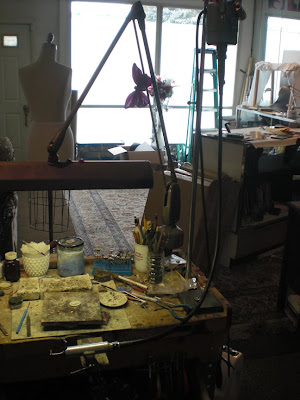
One of the biggest problems facing bench jewelers and many folks who work with their hands is hand fatigue. RSS or repetitive stress syndrome is a more serious problem that happens as a result of regular constant work that puts stresses one particular part of the body. At my workbench I am constantly inventing tools or ways to use my tools that reduce stress on my hands.
The flexible shaft machine is a common tool among different types of craftspeople, and an outright necessity to a jeweler. For the unfamiliar: it is a handheld rotary tool like a drill with a long flexible cord that attaches to a hanging motor. It is similar to a Dremmel tool, (what they use in nail salons to buff acrylic nails) but more powerful.
The reason that a felx shaft machine is preferred to a handheld drill is because of its compact, lightweight hand-piece. It can be used comfortably for hours. Yet hours each day for weeks on end, that hand-piece can start to feel like a lead weight. So I have devised a clever solution. It is not appropriate for all jobs, but it works great for some.

I present: the mini-lathe. I found a miniature vice at an antique shop years ago, and had to have it because it was so very cute. It had no purpose at the time, but followed me for years, and finally a few weeks ago it found it's golden purpose in life: to hold the handpiece of my flex shaft machine sideways so that it can be used as a miniature lathe! Oh for joy! It is seen below used with a abrasive-impregnated rubber cylander for sanding and polishing small parts-- especially the ends of earring posts.

It is a huge relief on my hands to be able to let this perfect tiny vice hold the machine for me while I do tedious time consuming jobs. If you plan on trying something like this there are a few things to note:
-Be sure not to crush the hand-piece of the machine with the vice...and it's probably a good idea to try this only on your own equipment> if you are going to be an inventor, you have to invest in your own tools because you can't take a risk on public or community studio equipment.
-Always take the proper safety precautions especially when working with rotary equipment: wear safety glasses and be sure not to have loose hair or accessories that could get caught in the machine
-You have less control over the machine when it is held this way-- pay special attention to the angle that you are holding the metal
-Rubber wheels can cut through the metal very quickly, it is not advised to use them on flat surface, as this could create divets or ripples-- use sandpaper the old fashioned way for flat surfaces
--Be sure that the vice is secured well-- if securing it to your benchpin as I have done, be sure also that the benchpin is secure!
--Be careful if using pliers to tighten wingnuts especially on old equipment, it is possible to over-tighten and break the wing off the threaded portion (this is extremely difficult to fix)

Now that is a mini lathe! Great work space!
ReplyDeleteMichelle-